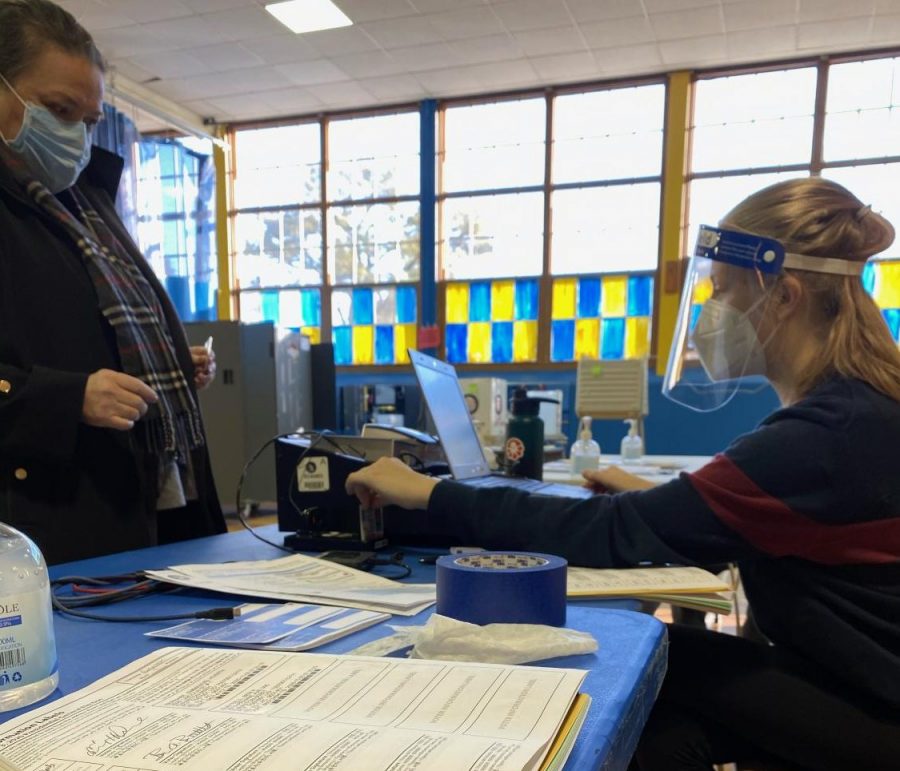Voting in a pandemic: COVID’s impact on the election
November 16, 2020
The COVID-19 pandemic has seemingly impacted every aspect of life in 2020, and the long-anticipated general election was no exception.
The United States’ number of COVID-19 cases and deaths greatly surpassed any other country with over 11.1 million cases and 246,000 deaths according to the Center for Disease Control COVID Data Tracker.
Each candidate’s stance on how the pandemic should be addressed on a policy level was a significant political issue in this election. Many have criticized Trump’s lax attitude and poor response to the pandemic, which included failing to institute a mask mandate, promoting messages that the virus is the Democratic Party’s “hoax” and telling people “don’t be afraid of it” in a tweet after receiving top medical care for his own case of COVID-19.
“I didn’t think any logical person could say that [Trump] handled [COVID-19] well,” senior Callie Stolar said. “I think I underestimated the ability for people to overlook things or convince themselves into believing things… I think it should have meant his immediate downfall.”
Biden has taken a very different stance, criticizing Trump for not trusting experts and scientists. Trump and Biden and many of their respective supporters have used very different language and supported different responses to the pandemic. In contrast to Trump, Biden has endorsed COVID-19 safety procedures including mask-wearing, free testing, paid leave from work and more.
“[Biden] always wears a mask, he demonstrates the safety guidelines, so I would trust him to do that with the country because he takes care of himself in that way,” Student Representative Carmiya Bady said. “I’m not faulting Trump for the act of the virus; it’s no one’s fault. You can’t really do anything about it, but once it got here, there were literally no precautions taken on his end.”
Beyond failing to adequately address the virus, many feel that Trump didn’t properly act as a guide for the nation, something seen in his dismissal of Coronavirus-related deaths, saying, “it is what it is.”
“The presidency has evolved to also be [role] of reassurance and leadership for the country through tough times. Trump failed to do that,” senior Jonathan Zenkich said. “He was hesitant from the beginning to kind of endorse all the common-sense measures to prevent the spreading of the virus… In terms of policy, I think that the administration as a whole has done a relatively okay job. I think that they did kind of what they could with the information they had.”
There is debate around whether the Trump administration could have taken precautions on the national-level earlier than mid-March to prevent the initial spread of the virus. In a Feb. 7 interview with journalist Bob Woodward, Trump said “This is deadly stuff,” in regards to the coronavirus. In another interview on March 19, Trump told Woodward “I wanted to always play it down. I still like playing it down, because I don’t want to create a panic.”
COVID-19 was not only a political issue but had an impact on the voting procedures this year.
According to the U.S. Elections Project’s most recent count, over 101.6 million Americans voted before Election Day, 36 million in-person and 65 million by mail, with another 26.8 mail-in ballots outstanding. This was more than double the number of early voters in the 2016 election.
“I think [mail-in ballots] played the biggest role in increasing voter turnout,” senior Dan Drew said. “More people had easier access to vote through mail-in ballots and early voting. Mail-in ballots are a really good thing for democracy. It cuts out a lot of possibility for voter suppression if done right.”
Trump consistently claimed that the increased use of mail-in ballots in this election would lead to widespread voter fraud. In addition, he has filled many lawsuits against various states, with a lack of evidence, ordering recounts and stopping ballot counting.
“We’ve also seen a historically large number of mail-in ballots, which is of no surprise because voting in-person is a health concern for many people,” senior Sarika Waikar said. “It’s also no surprise that Trump invalidates those votes, seeing as they’re typically blue, especially in this election.”
Around the country, more young people signed up to work the polls on Election Day than in other years. Although the option to work the polls was always open to high school juniors and seniors in Cook County, more young people seemed to step up, recognizing that older people generally face a more serious risk exposing themselves to COVID-19 in a high traffic environment such as a polling place. Senior Oliver Leopold is one ETHS student who worked as an election judge on Election Day.
“I said, ‘I’m in a lower risk category; this is something I kind of need to do.’ I already have the training, I already know how it goes. If it means me being out there at the election, instead of them pushing an older person out there, I would like to do that,” Leopold said.
Although there’s no way to know how the 2020 general election would have looked different if the pandemic had never existed, the Biden-Harris ticket did enough during these strange times to win an election—one with the record-breaking turnout—amid a pandemic.











